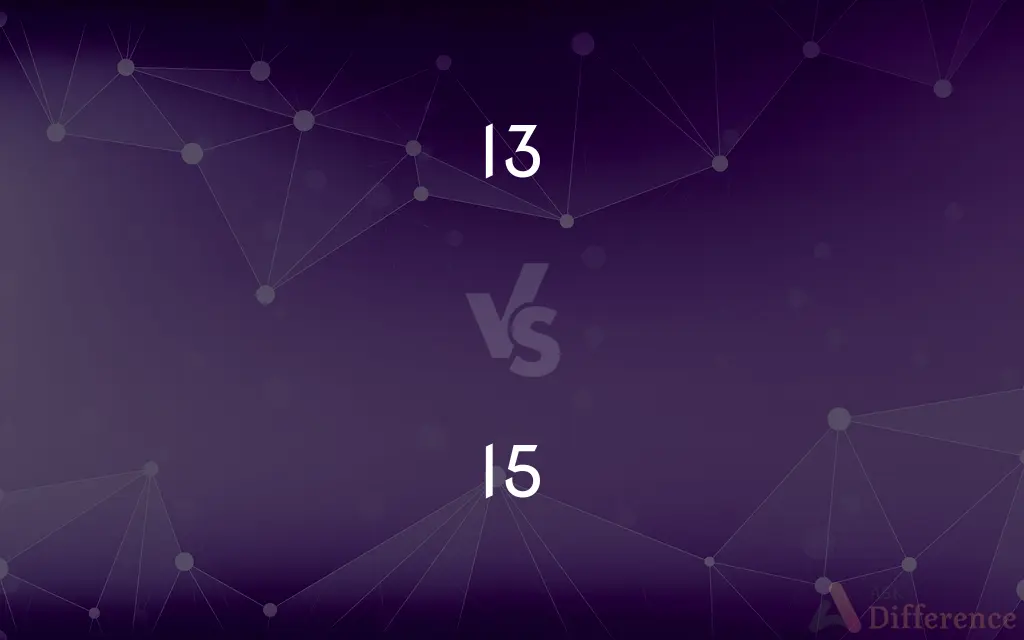I3 vs. I5 — What's the Difference?
By Tayyaba Rehman — Published on January 25, 2024
Intel Core i3 processors are entry-level CPUs, ideal for basic tasks, while i5 processors are mid-range, offering better performance for more demanding use.

Difference Between I3 and I5
Table of Contents
ADVERTISEMENT
Key Differences
The Intel Core i3 is an entry-level processor designed for basic computing tasks like web browsing, document editing, and media playback. The Core i5, on the other hand, is a mid-range processor offering better performance for more intensive tasks like gaming, content creation, and multitasking.
Core i3 processors typically have fewer cores and lower clock speeds compared to i5 processors. This makes i5 processors faster and more efficient at handling multiple tasks or more demanding software applications.
In terms of price, i3 processors are more budget-friendly, catering to users who need a computer for everyday tasks without the need for intensive processing power. Core i5 processors are priced higher, reflecting their enhanced capabilities and suited for users who need a balance of performance and cost.
Core i3 processors are often found in budget laptops, entry-level desktops, and all-in-ones. Core i5 processors are commonly used in mid-range to high-end laptops and desktops, offering a good balance of power and efficiency for most users.
While both i3 and i5 processors are part of Intel's Core lineup and share many architectural features, the i5's additional cores, higher clock speeds, and advanced technologies like Turbo Boost and Hyper-Threading (in some models) provide a significant performance edge.
ADVERTISEMENT
Comparison Chart
Performance Level
Basic performance, suitable for everyday tasks
Mid-range performance, handles demanding tasks
Processor Cores
Fewer cores, lower clock speeds
More cores, higher clock speeds
Price Range
Budget-friendly, lower cost
Higher cost, offers better price-to-performance
Typical Use
Found in budget and entry-level computers
Used in mid-range to high-end computers
Technologies
Basic, without Turbo Boost or Hyper-Threading
Often includes Turbo Boost, Hyper-Threading
Compare with Definitions
I3
More budget-friendly in the Intel Core lineup.
I chose a Core i3 to stay within my budget for a new computer.
I5
Priced higher, balancing cost and advanced capabilities.
I invested in an i5 for a good balance of price and performance.
I3
Offers essential performance for everyday tasks.
The Core i3 in my desktop handles all my office work smoothly.
I5
A mid-range processor offering better performance.
The i5 in my laptop handles gaming and multitasking effortlessly.
I3
Generally has fewer cores and lower clock speeds.
The i3's dual-core setup is sufficient for my basic software needs.
I5
Suitable for gaming, content creation, and multitasking.
I upgraded to an i5 processor for better video editing performance.
I3
Found in budget laptops and entry-level desktops.
This entry-level desktop is equipped with an Intel Core i3.
I5
Common in mid-range to high-end computers.
This high-end ultrabook is powered by an Intel Core i5.
I3
An entry-level processor suitable for basic computing.
My new laptop has an i3 processor, which is perfect for my daily web browsing.
I5
Has more cores and higher clock speeds than i3.
My Core i5's quad-core setup speeds up my workflow significantly.
Common Curiosities
Can I use an i5 processor for professional work?
Yes, the i5 is well-suited for professional work, including content creation and software development.
Is the Intel Core i3 enough for a student?
For most students, an i3 processor is sufficient for everyday tasks like writing papers and doing research.
Do i3 processors have good energy efficiency?
Yes, i3 processors are designed to be energy-efficient, making them ideal for basic and portable devices.
What is the main advantage of an i5 over an i3?
The main advantage of an i5 is its higher processing power and speed, making it better for multitasking and more intensive applications.
What is the Intel Core i3 processor best used for?
The Intel Core i3 is best for basic computing tasks like web browsing, document editing, and media playback.
What type of tasks is the Intel Core i5 suitable for?
The Intel Core i5 is suitable for more demanding tasks like gaming, content creation, and multitasking.
Can I upgrade from an i3 to an i5 processor?
Upgrading from an i3 to an i5 depends on the compatibility of your motherboard and other system components.
Is the i3 processor good for gaming?
The i3 can handle light gaming, but for more demanding games, an i5 or higher is recommended.
Do both i3 and i5 processors support Hyper-Threading?
Some models of i5 support Hyper-Threading, while most i3 processors do not.
Are i5 processors significantly more expensive than i3s?
While i5s are generally more expensive than i3s, they offer better performance, making them a worthwhile investment.
Are i3 processors suitable for online streaming?
An i3 processor can handle online streaming of videos and music adequately.
Is an i5 processor good for video editing?
Yes, an i5 processor can handle video editing, but for more intensive tasks, higher-end processors might be needed.
How does the i5 perform in terms of multitasking?
The i5 performs very well in multitasking, thanks to its higher core count and faster speeds.
Is there a significant difference in power consumption between i3 and i5?
The i5 may consume more power due to its higher performance capabilities, but this varies based on the specific model and generation.
Should I choose an i3 or i5 for a home office PC?
For a home office PC, an i5 is generally preferred for its better performance, especially if multitasking or more demanding applications are involved.
Share Your Discovery

Previous Comparison
ZFS vs. UFS
Next Comparison
Gideon’s Bible vs. KJV BibleAuthor Spotlight
Written by
Tayyaba RehmanTayyaba Rehman is a distinguished writer, currently serving as a primary contributor to askdifference.com. As a researcher in semantics and etymology, Tayyaba's passion for the complexity of languages and their distinctions has found a perfect home on the platform. Tayyaba delves into the intricacies of language, distinguishing between commonly confused words and phrases, thereby providing clarity for readers worldwide.
















































